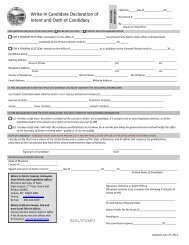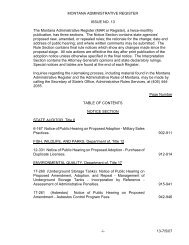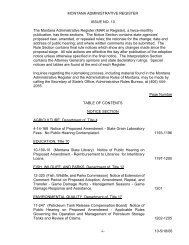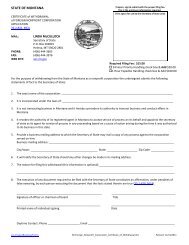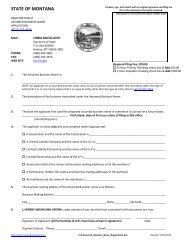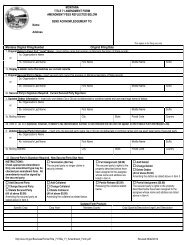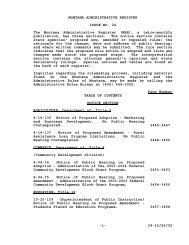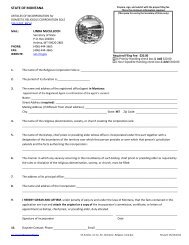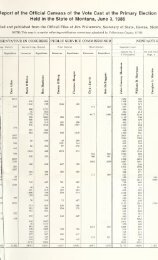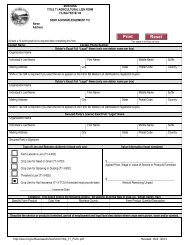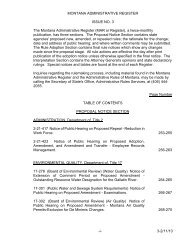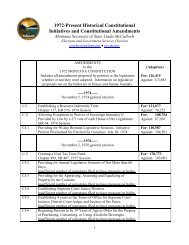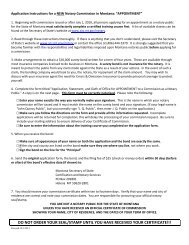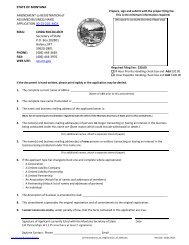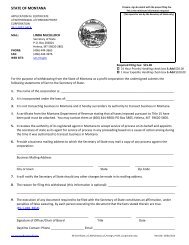Notary Handbook - the Montana Secretary of State Website
Notary Handbook - the Montana Secretary of State Website
Notary Handbook - the Montana Secretary of State Website
Create successful ePaper yourself
Turn your PDF publications into a flip-book with our unique Google optimized e-Paper software.
NOTARY JOURNAL<br />
All <strong>Montana</strong> notaries are required by law to “keep and maintain an<br />
<strong>of</strong>ficial notary journal recording <strong>the</strong> details <strong>of</strong> each notarial act<br />
performed, including <strong>the</strong> date, <strong>the</strong> type <strong>of</strong> notarial act, <strong>the</strong> type <strong>of</strong><br />
document, date <strong>of</strong> document, <strong>the</strong> name, address, and signature <strong>of</strong><br />
<strong>the</strong> individual for whom <strong>the</strong> notarization was performed, <strong>the</strong> type<br />
<strong>of</strong> identification used, and any o<strong>the</strong>r information prescribed by <strong>the</strong><br />
secretary <strong>of</strong> state.” [1-5-416(1)(g), MCA] {Emphasis added.}<br />
“An <strong>of</strong>ficial notary journal” is a commercially available electronic<br />
journal or bound paper book designed specifically for this purpose.<br />
Paper journals may be obtained from a local <strong>of</strong>fice supply store or<br />
o<strong>the</strong>r retailer, or <strong>the</strong>y are available online from many sources.<br />
There are different formats available; you may choose whichever<br />
you prefer as long as <strong>the</strong> records are chronologically numbered and<br />
<strong>the</strong> book is designed in such a way as to prohibit any deletion,<br />
alteration, or modification <strong>of</strong> <strong>the</strong> pages. You may not use a loose-leaf notebook. Electronic journals must be<br />
commercially produced and create chronological, sequential, and non-modifiable records that can be accessed<br />
upon demand and turned over in digital format to <strong>the</strong> <strong>Secretary</strong> <strong>of</strong> <strong>State</strong>’s <strong>of</strong>fice in accordance with §1-5-419, MCA.<br />
A <strong>Montana</strong> notary journal must contain <strong>the</strong><br />
following information:<br />
1.) The date <strong>of</strong> <strong>the</strong> notarization;<br />
2.) The type <strong>of</strong> notarial act performed;<br />
3.) The type <strong>of</strong> document;<br />
4.) The date <strong>of</strong> <strong>the</strong> document;<br />
5.) The name, address, and signature<br />
<strong>of</strong> <strong>the</strong> person for whom <strong>the</strong> notarization was<br />
performed; and<br />
6.) The type <strong>of</strong> identification used.<br />
You may include o<strong>the</strong>r information regarding<br />
<strong>the</strong> specific circumstances or o<strong>the</strong>r nonprivate<br />
information relevant to <strong>the</strong><br />
identification <strong>of</strong> <strong>the</strong> party or to <strong>the</strong> situation.<br />
This information is basic and all<br />
commercially available electronic and paper<br />
notary records (journals, logs) will<br />
accommodate this information.<br />
The journal should record <strong>the</strong> type <strong>of</strong> identification used – i.e.,<br />
“<strong>Montana</strong> driver’s license”, “Canadian passport”, “personal<br />
knowledge”, “Oath <strong>of</strong> ______________, acting as a credible<br />
witness”, etc. Many journals on <strong>the</strong> market have space for<br />
additional information not required by <strong>Montana</strong> law. This is to<br />
accommodate <strong>the</strong> requirements <strong>of</strong> o<strong>the</strong>r states. <strong>Montana</strong> notaries<br />
do not have to include any information not statutorily mandated;<br />
however, if a notary chooses to include <strong>the</strong> signer’s fingerprint,<br />
picture, or contemporaneous notes pertaining to <strong>the</strong> specific<br />
situation, that is acceptable.<br />
The most important and critical element <strong>of</strong> <strong>the</strong> journal is <strong>the</strong><br />
signature <strong>of</strong> <strong>the</strong> person for whom you are performing <strong>the</strong><br />
notarization, along with <strong>the</strong> person’s printed name and address.<br />
That one single element provides conclusive pro<strong>of</strong> that <strong>the</strong> signer<br />
was physically present to <strong>the</strong> notary when <strong>the</strong> document was<br />
notarized, and is <strong>the</strong> most effective tool notaries have to protect<br />
<strong>the</strong>mselves against becoming <strong>the</strong> victim <strong>of</strong> fraud or having to<br />
defend <strong>the</strong>mselves against claims <strong>of</strong> fraud.<br />
As noted above, <strong>the</strong> notary journal is a valuable tool that protects<br />
notaries as well as <strong>the</strong>ir employers and <strong>the</strong> public. It is absolutely<br />
mandatory that every single notarial act be recorded, however, or<br />
<strong>the</strong> effectiveness <strong>of</strong> <strong>the</strong> tool can be negated. Notaries who<br />
frequently notarize for <strong>the</strong> same person may find ways to group a collection <strong>of</strong> documents, perhaps by file number<br />
or date, so that one validating signature can suffice for several related notarial acts<br />
performed on <strong>the</strong> same date. The <strong>Notary</strong> Section <strong>of</strong> <strong>the</strong> <strong>Montana</strong> <strong>Secretary</strong> <strong>of</strong> <strong>State</strong>’s<br />
Office will assist notaries individually in determining appropriate ways <strong>of</strong> complying<br />
with <strong>the</strong> legal requirements and minimizing unnecessary redundancies. Please contact<br />
a notary specialist by phone or e-mail to discuss your specific situation. On <strong>the</strong><br />
following pages are examples <strong>of</strong> proper journal entries.<br />
The information that <strong>Montana</strong><br />
notaries are required to keep in<br />
<strong>the</strong> journal should not violate <strong>the</strong><br />
privacy rights <strong>of</strong> <strong>the</strong> signers.<br />
Specific information unique to <strong>the</strong><br />
identity <strong>of</strong> <strong>the</strong> signer, such as<br />
license numbers, social security<br />
numbers, or birthdates should<br />
never be entered into <strong>the</strong> notary<br />
journal.<br />
TIP: Be sure to<br />
enter your name in<br />
<strong>the</strong> front <strong>of</strong> your<br />
journal.<br />
10



